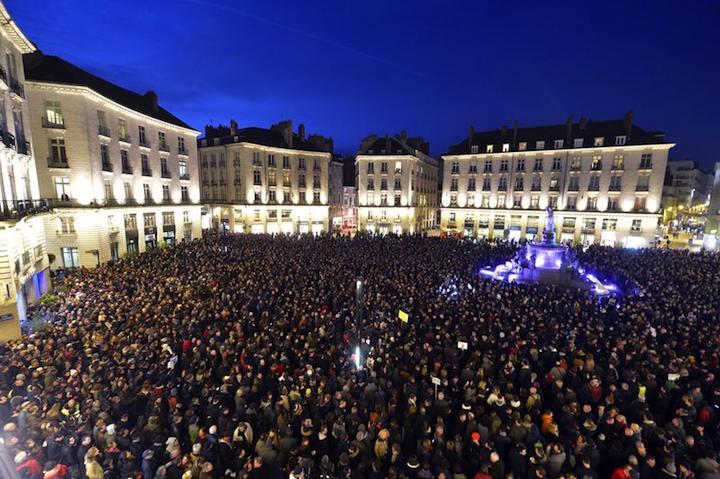Charlie Hebdo and Freedom of Speech

On Tuesday night MoMA hosted a panel discussion, Charlie Hebdo, Zero Tolerance, and Freedom of Speech. The panelists were journalist, author, and former editor of the Sunday Times Sir Harold Evans as moderator; artist Kader Attia; artist Sharon Hayes; actor and Daily Show correspondent Aasif Mandvi; VICE News editor-in-chief Jason Mojica; author and historian Simon Schama; and commentator, satirist, and architect Karl Sharro. Photo above: People rally in the Place Royale in Nantes, France, in solidarity with the murdered journalists of Charlie Hebdo. (Georges Gobet/AFP/Getty)
Like many around the globe, people in the arts are contemplating the complex issues of free speech after the tragic events at Charlie Hebdo, in January. The panel explored the complex interrelationships between freedom, society, justice, culture, and art.
A few minutes into the discussion, French-Algerian artist Kadar Attia, who described himself as a “cultural Muslim,” for whom the offending cartoon of the prophet Mohammed that triggered the attack made him “uncomfortable,” stated that the Hebdo tragedy has nothing to do with freedom of expression. He went on to say that Al Quida was loosing ground to Islamic State [ISIS or ISL] terrorists, and for this reason they sought renewed media attention through violence. He pointed out that the killers hold French ID cards and do not speak Arabic. The point, Attia said, is that since 9/11 and other terrorist attacks in Europe, the French have envisioned terrorists as “guys with long beards who look like Bin Laden. Today we know it can be anybody from within your own society.”
The panel provided a better informed discussion, from a cultural point of view, than most media coverage, which has bordered on an institutionalized fact-sheet point-list approach. Among the ideas that came up:
Freedom of expression, in many countries where it is guaranteed, is conditional on racial/socioeconomic status.
In France, there are legitimately irrational injustices, largely shaped by post-colonial amnesia—for example the ban on the veil. It provides fodder for what terrorists do: they use an actual societal injustice and elevate it to radicalism.
Official control of speech we find uncomfortable, perceived to threaten civic peace, contributes to aggravating racial tensions.
Reason is our guide and freedom is based on choice. We have the right to be offended by a disrespectful image of the prophet Mohammed even if the offensive nature of the image leads to more violence.
This is not about Western values—an interesting point of discussion that was unfortunately curtailed by the statement: "Western values vs Islamic intolerance -- then you have a war of ideas".
There are legitimate reasons why terrorists are inspired to incite violence. Drones, for example.
We must distinguish between art and propaganda.
If you would like to watch the discussion, go here. In addition, New York magazine has posted a page detailing some of the more thoughtful post-Hebdo published opinion, here.


